#Elysium - Wiktionary
Explore tagged Tumblr posts
Text
well harry is dogcoded and birdcoded with a hint of leopard. fuck you
#the screenshot from Wiktionary of all the definitions of Harrier is so beautiful to me. thats him yaay ❤️#gemitus#disco elysium
0 notes
Text
Do you want to hear me geek out about the Greek mythology references in LNDS? Yeah, you do.

In part 1 and part 2 of my theories on Sylus' myth, I've touched upon how it feels like there is a heavy reference to the myth of Hades and Persephone. In part 2, I also bring up Eros and Psyche briefly.
Quick blurbs for those unfamiliar with the two stories:
Hades, god of the Underworld, abducted the goddess Persephone from aboveground to be his bride and queen. As a result of eating food from the Underworld (pomegranate seeds), Persephone is bounded to return to the Underworld for a part of the year to be with her husband. The remaining months, she was allowed to return to the mortal world with her mother.
Eros (aka Cupid in Roman myths) was tasked by his mother, the goddess Aphrodite, to make Psyche fall in love with the most hideous creature as retribution for offending the goddess simply with her beauty. Upon seeing Psyche, Eros accidentally pricked himself with his own arrow and fell in love with her.

Tartarus, the infernal regions of ancient Greek mythology. The name was originally used for the deepest region of the world, the lower of the two parts of the underworld, where the gods locked up their enemies. It gradually came to mean the entire underworld. — Britannica
@fandomghostwrite actually reminded me of this in a comment in part 1 of my theory.

Elysium, in Greek mythology, originally the paradise to which heroes on whom the gods conferred immortality were sent. — Britannica

Devil in late settings of the legend of Faust. — Britannica
*Mephistopheles, aka Mephisto, is from German folklore, but its name is of Greek origin:
The name Mephistopheles is a corrupted Greek compound.[2] The Greek particle of negation (μή, mē) and the Greek word for "love" or "loving" (φίλος, philos) are the first and last terms of the compound, but the middle term is more doubtful. — Wikipedia
The crow also plays a significant role in a myth about the sun god Apollo and his mortal lover, Coronis. In the myth, the crow, once white, was tasked with guarding Coronis and acted as a messenger of the sun god. When it revealed to Apollo of Coronis' unfaithfulness, in anger and retribution, Apollo scorched the bird, turning all of its feathers black.

Onychinus - onyx, a gemstone, that also lends its name for the color black. — Wiktionary The word borrows from Ancient Greek ὀνῠ́χῐνος (onúkhinos).
#love and deepspace#love and deepspace sylus#lnds analysis#me waiting for the update to finish#i don't want to hear nothing about game devs being lazy#they are doing amazing
55 notes
·
View notes
Text
Elysium is a lovely sounding word which in English means "a place or state of ideal happiness," but its primary original definition comes lifted straight from Greek mythology, where Elysium was the name of the home of the blessed souls after death. This word in Ancient Greek was Hλύσιον, Ēlúsion. This same mythical location was also referred to as the Isles of the Blessed.
In older writings, it was specifically reserved for those singled out and favored by the gods. Heroes and other immortals would be rewarded with a place here to pass the rest of their eternity in bliss. As time went on, the concepts of punishment and reward in the afterlife became more widespread, which eventually merged Elysium more deeply into the concept of afterlife for all people. It became one of several possible levels of Hades which departed souls might find themselves in, depending on a favorable judgement passed on their conduct by the Underworld judges Minos, Rhadamanthys and Aeacus.
Importantly though, Ancient Greek religion was hugely varied and constantly evolving, so this wasn't the only theory or iteration.
There doesn't seem to be any agreement on the etymology of the word beyond the Ancient Greek, but one source I found suggested that it might have something to do with another Greek word, which is the verb meaning "to relieve or release." In that interpretation, Elysium might have been the paradise which promised relief from the pain and burdens of living.
#Harper's Dictionary of Classical Literature and Antiquities - Google Books#Elysium | Greek mythology | Britannica#Elysium - Wiktionary#A Dictionary of the Ancient Greek World - David Sacks#Oswyn Murray - Google Books#Henry George Liddell#Robert Scott#A Greek-English Lexicon#Ἠλύσιον (tufts.edu)#ELYSIUM - Islands of the Blessed of Greek Mythology (theoi.com)#Ancient Greek Dictionary Online Translation LEXILOGOS#ancient greek#linguistics#language#history#ancient languages#mythology#greek mythology#afterlife#ancient greek religion#gods#myths#stories#fun facts#words#vocabulary#historical linguistics#etymology#philology#i love words that start out as stories
90 notes
·
View notes
Photo
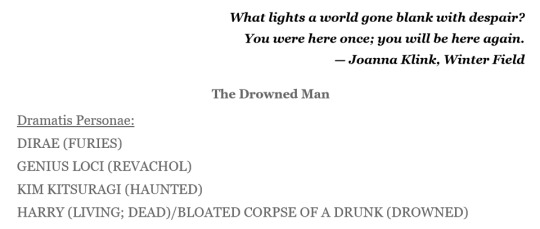
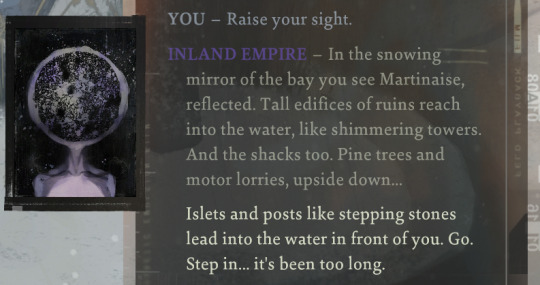
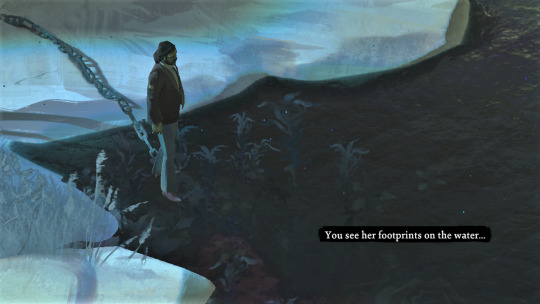
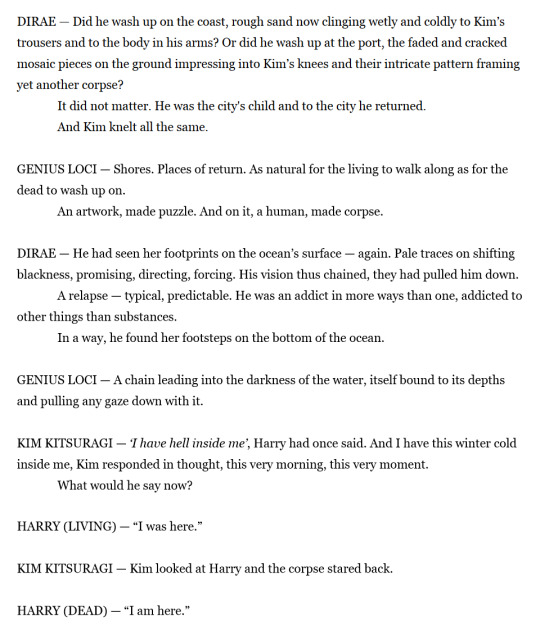
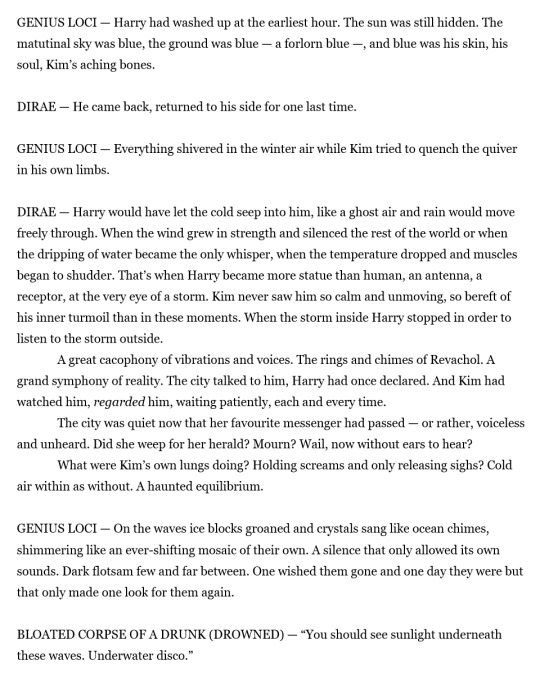
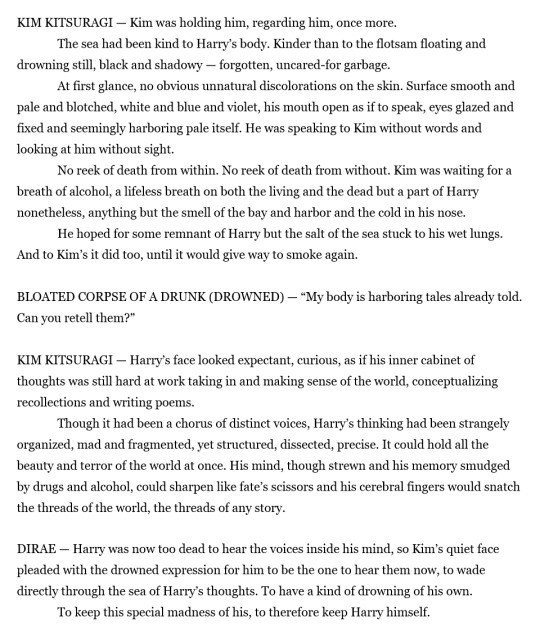
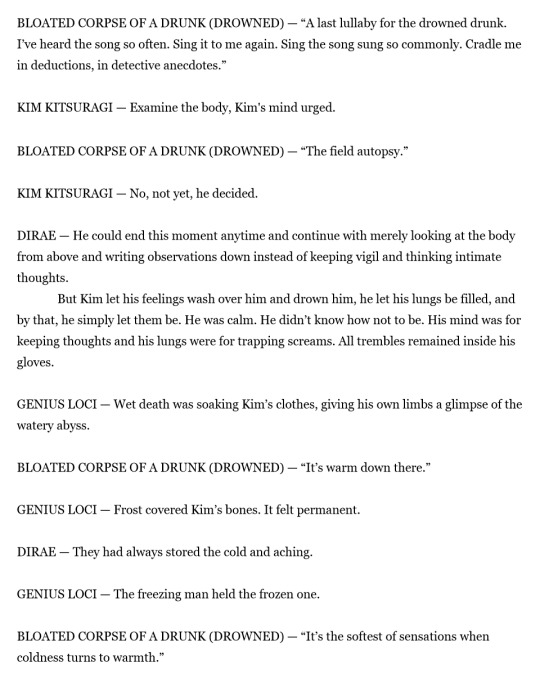
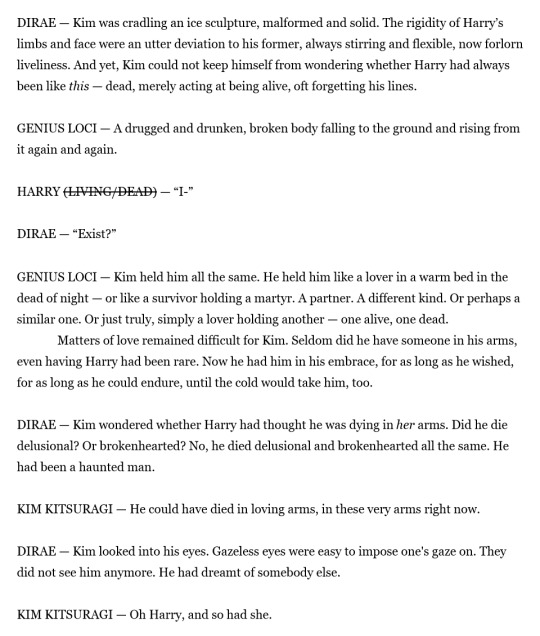
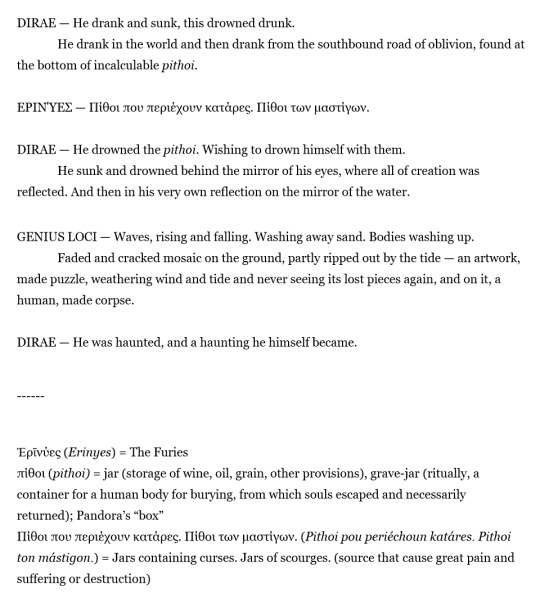
The Drowned Man (Ao3 / GoogleDoc / story under the cut)
What lights a world gone blank with despair? You were here once; you will be here again. — Joanna Klink, Winter Field
Dramatis Personae: DIRAE (FURIES) GENIUS LOCI (REVACHOL) KIM KITSURAGI (HAUNTED) HARRY (LIVING; DEAD)/BLOATED CORPSE OF A DRUNK (DROWNED)
DIRAE — Did he wash up on the coast, rough sand now clinging wetly and coldly to Kim’s trousers and to the body in his arms? Or did he wash up at the port, the faded and cracked mosaic pieces on the ground impressing into Kim’s knees and their intricate pattern framing yet another corpse? It did not matter. He was the city's child and to the city he returned. And Kim knelt all the same.
GENIUS LOCI — Shores. Places of return. As natural for the living to walk along as for the dead to wash up on. An artwork, made puzzle. And on it, a human, made corpse.
DIRAE — He had seen her footprints on the ocean’s surface — again. Pale traces on shifting blackness, promising, directing, forcing. His vision thus chained, they had pulled him down. A relapse — typical, predictable. He was an addict in more ways than one, addicted to other things than substances. In a way, he found her footsteps on the bottom of the ocean.
GENIUS LOCI — A chain leading into the darkness of the water, itself bound to its depths and pulling any gaze down with it.
KIM KITSURAGI — ‘I have hell inside me’, Harry had once said. And I have this winter cold inside me, Kim responded in thought, this very morning, this very moment. What would he say now?
HARRY (LIVING) — “I was here.”
KIM KITSURAGI — Kim looked at Harry and the corpse stared back.
HARRY (DEAD) — “I am here.”
GENIUS LOCI — Harry had washed up at the earliest hour. The sun was still hidden. The matutinal sky was blue, the ground was blue — a forlorn blue —, and blue was his skin, his soul, Kim’s aching bones.
DIRAE — He came back, returned to his side for one last time.
GENIUS LOCI — Everything shivered in the winter air while Kim tried to quench the quiver in his own limbs.
DIRAE — Harry would have let the cold seep into him, like a ghost air and rain would move freely through. When the wind grew in strength and silenced the rest of the world or when the dripping of water became the only whisper, when the temperature dropped and muscles began to shudder. That’s when Harry became more statue than human, an antenna, a receptor, at the very eye of a storm. Kim never saw him so calm and unmoving, so bereft of his inner turmoil than in these moments. When the storm inside Harry stopped in order to listen to the storm outside. A great cacophony of vibrations and voices. The rings and chimes of Revachol. A grand symphony of reality. The city talked to him, Harry had once declared. And Kim had watched him, regarded him, waiting patiently, each and every time. The city was quiet now that her favourite messenger had passed — or rather, voiceless and unheard. Did she weep for her herald? Mourn? Wail, now without ears to hear? What were Kim’s own lungs doing? Holding screams and only releasing sighs? Cold air within as without. A haunted equilibrium.
GENIUS LOCI — On the waves ice blocks groaned and crystals sang like ocean chimes, shimmering like an ever-shifting mosaic of their own. A silence that only allowed its own sounds. Dark flotsam few and far between. One wished them gone and one day they were but that only made one look for them again.
BLOATED CORPSE OF A DRUNK (DROWNED) — “You should see sunlight underneath these waves. Underwater disco.”
KIM KITSURAGI — Kim was holding him, regarding him, once more. The sea had been kind to Harry’s body. Kinder than to the flotsam floating and drowning still, black and shadowy — forgotten, uncared-for garbage. At first glance, no obvious unnatural discolorations on the skin. Surface smooth and pale and blotched, white and blue and violet, his mouth open as if to speak, eyes glazed and fixed and seemingly harboring pale itself. He was speaking to Kim without words and looking at him without sight. No reek of death from within. No reek of death from without. Kim was waiting for a breath of alcohol, a lifeless breath on both the living and the dead but a part of Harry nonetheless, anything but the smell of the bay and harbor and the cold in his nose. He hoped for some remnant of Harry but the salt of the sea stuck to his wet lungs. And to Kim’s it did too, until it would give way to smoke again.
BLOATED CORPSE OF A DRUNK (DROWNED) — “My body is harboring tales already told. Can you retell them?”
KIM KITSURAGI — Harry’s face looked expectant, curious, as if his inner cabinet of thoughts was still hard at work taking in and making sense of the world, conceptualizing recollections and writing poems. Though it had been a chorus of distinct voices, Harry’s thinking had been strangely organized, mad and fragmented, yet structured, dissected, precise. It could hold all the beauty and terror of the world at once. His mind, though strewn and his memory smudged by drugs and alcohol, could sharpen like fate’s scissors and his cerebral fingers would snatch the threads of the world, the threads of any story.
DIRAE — Harry was now too dead to hear the voices inside his mind, so Kim’s quiet face pleaded with the drowned expression for him to be the one to hear them now, to wade directly through the sea of Harry’s thoughts. To have a kind of drowning of his own. To keep this special madness of his, to therefore keep Harry himself.
BLOATED CORPSE OF A DRUNK (DROWNED) — “A last lullaby for the drowned drunk. I’ve heard the song so often. Sing it to me again. Sing the song sung so commonly. Cradle me in deductions, in detective anecdotes.”
KIM KITSURAGI — Examine the body, Kim's mind urged.
BLOATED CORPSE OF A DRUNK (DROWNED) — “The field autopsy.”
KIM KITSURAGI — No, not yet, he decided.
DIRAE — He could end this moment anytime and continue with merely looking at the body from above and writing observations down instead of keeping vigil and thinking intimate thoughts. But Kim let his feelings wash over him and drown him, he let his lungs be filled, and by that, he simply let them be. He was calm. He didn’t know how not to be. His mind was for keeping thoughts and his lungs were for trapping screams. All trembles remained inside his gloves.
GENIUS LOCI — Wet death was soaking Kim’s clothes, giving his own limbs a glimpse of the watery abyss.
BLOATED CORPSE OF A DRUNK (DROWNED) — “It’s warm down there.”
GENIUS LOCI — Frost covered Kim’s bones. It felt permanent.
DIRAE — They had always stored the cold and aching.
GENIUS LOCI — The freezing man held the frozen one.
BLOATED CORPSE OF A DRUNK (DROWNED) — “It’s the softest of sensations when coldness turns to warmth.”
DIRAE — Kim was cradling an ice sculpture, malformed and solid. The rigidity of Harry’s limbs and face were an utter deviation to his former, always stirring and flexible, now forlorn liveliness. And yet, Kim could not keep himself from wondering whether Harry had always been like this — dead, merely acting at being alive, oft forgetting his lines.
GENIUS LOCI — A drugged and drunken, broken body falling to the ground and rising from it again and again.
HARRY (LIVING/DEAD) — “I-”
DIRAE — “Exist?”
GENIUS LOCI — Kim held him all the same. He held him like a lover in a warm bed in the dead of night — or like a survivor holding a martyr. A partner. A different kind. Or perhaps a similar one. Or just truly, simply a lover holding another — one alive, one dead. Matters of love remained difficult for Kim. Seldom did he have someone in his arms, even having Harry had been rare. Now he had him in his embrace, for as long as he wished, for as long as he could endure, until the cold would take him, too.
DIRAE — Kim wondered whether Harry had thought he was dying in her arms. Did he die delusional? Or brokenhearted? No, he died delusional and brokenhearted all the same. He had been a haunted man.
KIM KITSURAGI — He could have died in loving arms, in these very arms right now.
DIRAE — Kim looked into his eyes. Gazeless eyes were easy to impose one's gaze on. They did not see him anymore. He had dreamt of somebody else.
KIM KITSURAGI — Oh Harry, and so had she.
DIRAE — He drank and sunk, this drowned drunk. He drank in the world and then drank from the southbound road of oblivion, found at the bottom of incalculable pithoi.
ΕΡΙΝΎΕΣ — Πίθοι που περιέχουν κατάρες. Πίθοι των μαστίγων.
DIRAE — He drowned the pithoi. Wishing to drown himself with them. He sunk and drowned behind the mirror of his eyes, where all of creation was reflected. And then in his very own reflection on the mirror of the water.
GENIUS LOCI — Waves, rising and falling. Washing away sand. Bodies washing up. Faded and cracked mosaic on the ground, partly ripped out by the tide — an artwork, made puzzle, weathering wind and tide and never seeing its lost pieces again, and on it, a human, made corpse.
DIRAE — He was haunted, and a haunting he himself became.
------
Ἐρῑνύες (Erinyes) = The Furies
πίθοι (pithoi) = jar (storage of wine, oil, grain, other provisions), grave-jar (ritually, a container for a human body for burying, from which souls escaped and necessarily returned); Pandora’s “box”
Πίθοι που περιέχουν κατάρες. Πίθοι των μαστίγων. (Pithoi pou periéchoun katáres. Pithoi ton mástigon.) = Jars containing curses. Jars of scourges. (source that cause great pain and suffering or destruction)
#disco elysium#disco elysium fanfic#harry du bois#kim kitsuragi#my writing#sorry to anyone who waited for this#editing takes me ages and i feel like i'm never done#it's not even long smh#sorry to anyone who speaks greek. i tried to translate to the best of my research (using wiktionary).#but it it's shit tell me and i change/delete it
28 notes
·
View notes
Photo
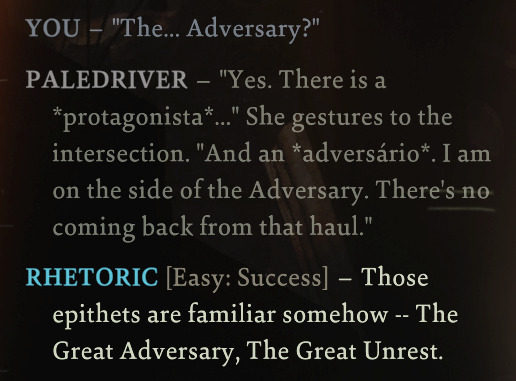
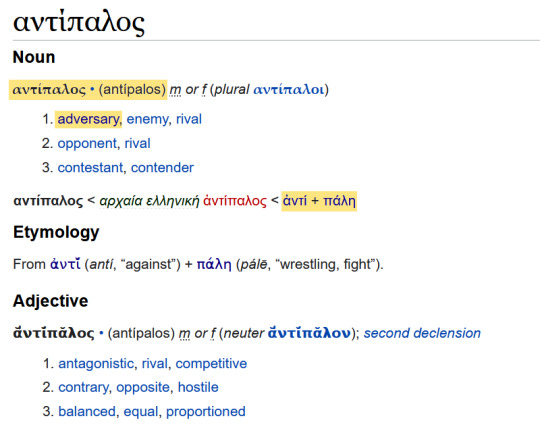
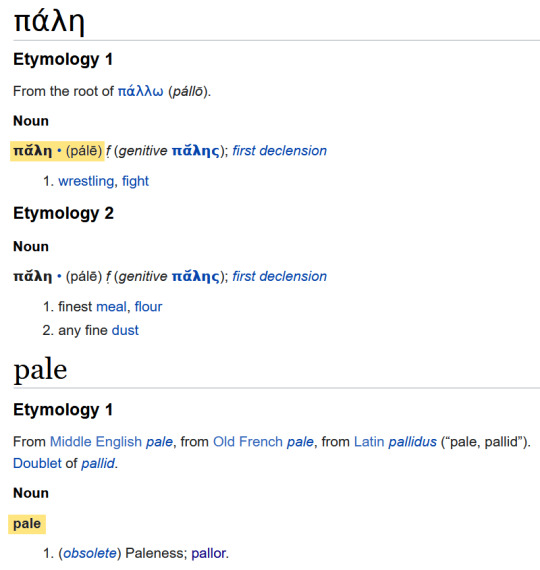
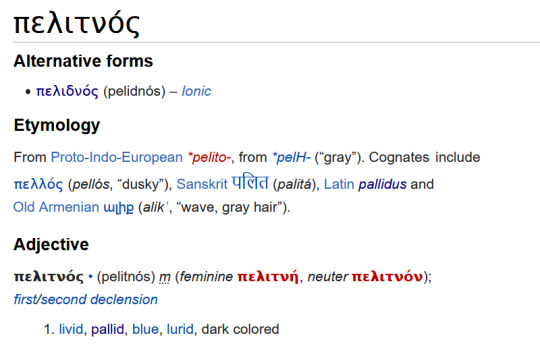
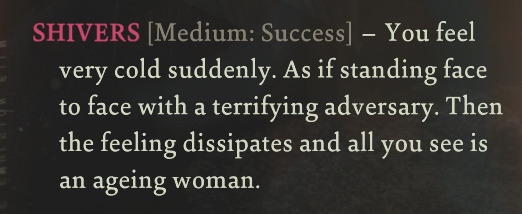

Disco Elysium: The Pale / The Adversary
#yes this is probably complete bullshit#i was just fucking around in wiktionary#disco elysium#disco compilation
44 notes
·
View notes